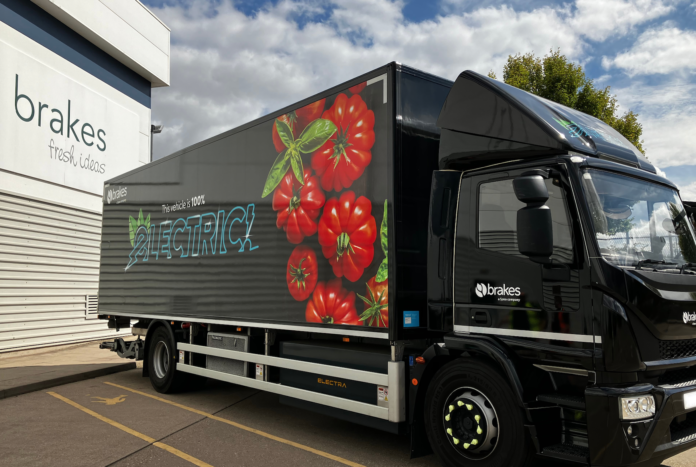Customers of Brakes will begin to receive deliveries from zero-emissions vehicles as part of a programme to understand the challenges and opportunities for decarbonising the company’s fleet.
Having already trialed nearly 2,500 electric vehicles to its U.S. fleet, the GB pilot will include a range of temperature-controlled electric vehicles, including two 19-tonne Heavy Goods Vehicles (HGVs) and two electric vans, across both Brakes and Sysco Speciality Group depots. Sysco hopes to provide a model for electric multi-temperature HGV deliveries as it tests the performance of the vehicles and batteries; collects data and builds understanding around the complexity of charging and route planning; and identifies the infrastructure required.
Read more: Sysco appoints global foodservice president
Mark Jenkins, supply chain and operations director, Sysco GB, said: “Our vehicles cover almost 60m miles a year. Transforming our fleet to zero-emissions will be vital to achieving the company’s ambitious science-based climate targets and supporting our customers to achieve their own. We’re excited to be delivering to customers in zero-emission multi-temperature vehicles, which can save around 69 tonnes of carbon per HGV each year. When you consider the impact of expanding that to our entire fleet, the potential is huge.”
Jenkins continues: “Innovation in electric vehicles and battery technology is moving incredibly fast, and vehicle range is no longer the biggest barrier. To convert our entire fleet would require significant investment in the UK’s charging infrastructure and a commitment from the industry to invest in the vehicle technology and therefore lower the cost. We are investigating all options and welcome partnerships with industry and government to join us in pioneering the future of foodservice delivery.”
Read more: Brakes and Sysco provide 2m meals for Fareshare
The new vehicles support Sysco’s ambitious, industry-leading climate goal to reduce emissions across its global operations and the company’s entire value chain. It will see the company aim to reduce its Scope 1 and 2 emissions by 27.5% between 2019 and 2030, and support suppliers, representing 67% of spend, to set their own science-based targets by 2026.








